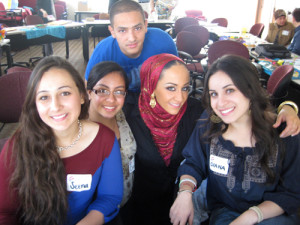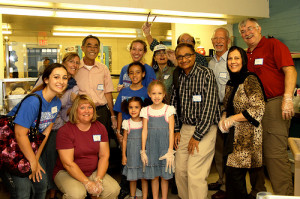Syrian Opposition Speaks
By Adam Kredo, October 27, 2012
Read the article at The Washington Free Beacon
President Barack Obama’s administration has continued to turn its back on Syrian opposition fighters, refusing to provide not only critical weaponry but also direct humanitarian aid to those fighting a bloody battle against embattled Syrian President Bashar al-Assad, according to an opposition leader who just returned from the battle’s front lines.
The dearth of direct support has enabled Assad to continue slaughtering citizens and opposition forces, prolonging a civil war that has claimed thousands of lives since it broke out over a year ago.
“I saw no support for the armed rebels by the U.S.,” Mouaz Moustafa, political director of the Syrian Emergency Task Force (SETF) and United for a Free Syria (UFS), said Friday afternoon during a conference call with reporters.
A lack of sophisticated weaponry has allowed armed terrorist groups, such as Iran-funded Hezbollah, to infiltrate Syria and stir chaos that could spill across the region, said Moustafa, who recently spent time in Syrian cities that have been decimated by Assad’s forces.
“There needs to be more serious arming of the [opposition] efforts,” he concluded. “That would greatly help depose the regime.”
A level of “military intervention to end the blood being spilled” would help rebel forces speed up Assad’s ouster, said Moustafa, who also serves as a board member for the Coalition for a Democratic Syria (CDS). “That’s something we’ve been very slow to move on.”
“The risks of not doing anything, not bombing … are far outweighed by the risks of letting these [attack on civilians] go on,” he added.
The United States also has failed to take a lead on the humanitarian front, Moustafa explained.
Currently, the U.S. sends aid to Syria via several United Nations bodies and other “middle men,” he said.
“It doesn’t have the stamp of the U.S.,” he said. “There’s middle men.”
It would send a “huge” message to the Syrian people if the U.S. were to take a more direct approach, Moustafa explained.
“We’re hoping to see it as more direct so Uncle Sam gets the credit,” he said. “It’s much needed.”
There are huge risks associated with the Obama administration’s continued passivity on the Syrian front, Moustafa said, including the rampant destruction and violence that continues to devastate towns along the Syria-Turkey border.
That violence could spread further into Turkey, potentially leading Saudi Arabia or even Jordan to get involved in what could become a regional conflict.
Additionally, if Assad falls, a power vacuum could allow militants and Islamic extremists to gain a foothold in the nation, as they have done in other Middle Eastern countries that have experienced tumult.
If the U.S. and other Western nations fail to prepare and organize local governments for the toppling of the Assad government, the situation in Syria could become “ten times more complicated and worse for the U.S.,” Moustafa said.
“We really have to take advantage because if we don’t … then we’ll end up with problems.”
There is growing evidence that Hezbollah and other extremist groups have been waging deadly cross border raids aimed at murdering Assad’s enemies.
Free Syrian Army fighters have recounted tales of being targeted by Hezbollah, according to reports.
Hezbollah has provided arms to pro-Assad forces, which routinely engage in the mass slaughter of innocent Syrian civilians.
Saudi Arabia has also reportedly armed opposition fighters in an effort to counter Iran and Hezbollah in Syria.
“Sectarian divisions driven by the war are sowing political instability outside of Syria, alongside the unstable security situation introduced by the fighting itself,” The Israel Project, a D.C.-based organization, wrote in a recent analysis of the conflict.
Moustafa reported seeing evidence of “spill over” from the conflict during his time in Syria.
“We see it already happening in certain places” such as Lebanon, he said.
Armed fighters have entered the conflict from Iraq, Moustafa said.
“There’s potential to have chaos in the entire region,” which is exactly what Assad is “banking on.”
To protect its borders, Turkey has established a de facto green line replete with artillery and soldiers. Government leaders have hoped to formalize this line, but it has yet to get explicit support from the Obama administration.
“The Turks are very much exposed,” Moustafa said. “There are no talks of formalizing this buffer zone ,though the Turks would like to see it.”
However, “it can only happen if the U.S. is at the table,” he added.
Violence has become so rooted in Syria that even a cease-fire during the Islamic religious holidays was short lived, according to reports.
Moustafa speculated that Assad has no reason to observe a temporary cease-fire and even less motivation to enact a long-term plan.
“I don’t think it could hold,” he said. If Assad ends the violence, “he will fall.”
Moustafa outlined the horrors the war has brought to areas of Syria such as Khirbet al-Joz, a Syrian border town that was razed by pro-Assad forces.
“The conditions of everyone in the village were horrendous,” Moustafa said, recalling “the smell of burning.”
Moutafa interviewed several pro-Assad prisoners of war who were being held captive by opposition forces in several warehouse-like structures in the town.
Some of them explained the reasons they were aiding the regime.
“Many of them are young men,” Moustafa recalled, “and they are stuck in this game being played by Assad.”


